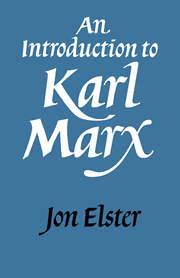Book contents
Summary
INTRODUCTION
The contrast and the conflict between the haves and the have-nots, the idle rich and the working poor, are constant themes of history. Marx's theory of exploitation is an attempt to provide a scientific, rigorous statement of these intuitive notions. In his work as a whole it serves two distinct purposes. On the one hand, it has an explanatory function. Exploitation, when perceived by the exploited, provides a motivation for revolt, protest, riot, or revolution. As such it can enter into the explanation of class struggle and social change. On the other hand, exploitation is a normative concept that is part of a wider theory of distributive justice. Exploitation, whether perceived by the exploited or not, is morally wrong. It is unfair that some should be able to earn an income without working or out of proportion with their work contribution.
The two purposes do not fully match. The normatively relevant concept of exploitation may not have strong motivational force. Because of a limited horizon, in space or time, the exploited may make mistakes about the identity of the exploiters and about the extent to which they are exploited. Workers may focus their struggle on managers, when in reality these are only passing on the surplus to shareholders. They may focus on the size of the surplus that is extracted from them, without noticing that part of it is reinvested in future production that partly redounds to their benefit.
Information
- Type
- Chapter
- Information
- An Introduction to Karl Marx , pp. 79 - 102Publisher: Cambridge University PressPrint publication year: 1986
